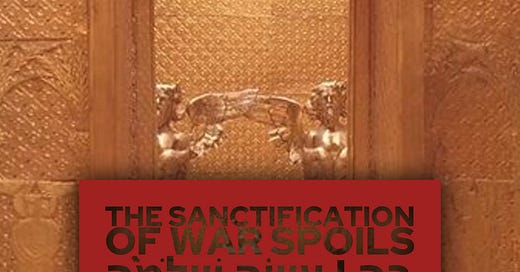War.
This word alone sends chills down our spine.
Now heard all day, echoing in our hearts and on our screens, daily reality of harm for many of our loved ones, it shatters our illusions of serenity.
Once again our news meet our biblical journey in heart wrenching ways.
On any given day reading these chapters in Chronicles that describe King David’s wars would be challenging. War always includes suffering and losses, no matter if it’s about a right cause, just fight, or not.
These days, as missiles and drones ravage lives and buildings across the world, the iron age battles between the Kingdom of Judah and its neighbors resonate in the most harrowing ways.
We ask of those torn and worn wars what we ask of the ones waged right now:
Were these wars essential?
Was there, is there, another way to handle conflicts, get along and set borders with neighboring nations that might not include the suffering of so many innocents?
Did David assert his kingdom’s power in defiance of the local nations or in response to their provoked attacks?
And what about the plunder?
As always, it’s a combination of different factors. Projecting our modern moral humane values on the battlegrounds of 3,000 years old is ambitious, to say the least.
And what we are reading in these chapters does not attempt to offer an objective angle. This book is about the glory of the House of David and the battles won to make the kingdom safer and bigger are celebrated with no reservations.
And yet to read these texts today with curiosity and a critical eye is to also honor humanity, to ask unpopular questions, and to wonder what are some of the narratives that emerge here, what we might learn, how we might practice war no more - or at least minimize its moral injury?
David’s army fights and defeats the Philistines, the Moabites and the Arameans - all within 6 verses.
The chapter then describes in detail some of the loot and where it was designated. Unlike the similar narrative in Samuel - this author wants us to know exact amounts and how it was repurposed:
וַיִּקַּ֣ח דָּוִ֗יד אֵ֚ת שִׁלְטֵ֣י הַזָּהָ֔ב אֲשֶׁ֣ר הָי֔וּ עַ֖ל עַבְדֵ֣י הֲדַדְעָ֑זֶר וַיְבִיאֵ֖ם יְרוּשָׁלָֽ͏ִם׃ וּמִטִּבְחַ֤ת וּמִכּוּן֙ עָרֵ֣י הֲדַדְעֶ֔זֶר לָקַ֥ח דָּוִ֛יד נְחֹ֖שֶׁת רַבָּ֣ה מְאֹ֑ד בָּ֣הּ ׀ עָשָׂ֣ה שְׁלֹמֹ֗ה אֶת־יָ֤ם הַנְּחֹ֙שֶׁת֙ וְאֶת־הָֽעַמּוּדִ֔ים וְאֵ֖ת כְּלֵ֥י הַנְּחֹֽשֶׁת׃
David took the gold shields carried by King Hadadezer’s retinue and brought them to Jerusalem; and from Tibbath and Cun, towns of Hadadezer, David took a vast amount of copper, from which Solomon made the bronze water tank, the columns, and the bronze vessels of the temple.
I_Chronicles.18:27
The original purpose of these wars was likely not to gain more gold and precious metals but this version of the story links the loot to the legacy of the future temple.
David wants to leave his sons enough plundered wealth in the coffers to continue where he left off.
David’s spoils aren’t trophies; they’re building blocks for an enduring Temple legacy that will outlive his royal house and lineage.
By weaving war loot into the Temple narrative, the Chronicler provides post-exilic Judaism an origin myth, anchored in victory, repurposed for sacred ends.
The moral dimension is either not present or obscured by life’s ongoing relay race. Stuff is stuff.
Did the pilgrims climbing up the holy hill towards the shiny temple know the origin of the glimmering god glitz? Did it matter to them or make them feel stronger and prouder of how powerful they were?
Perhaps deeper inside this triumphalist narrative is also the simple story of recycling, of the ways matter morphs and life goes on, and regardless of war scars and deep moral injuries we seek and we yearn again and again for simpler joys and for moral repair and for whatever helps us heal and live peaceful days again? That temple built with local loot was also destroyed by another empire and its gold taken to Babylon. The story goes on.
We recycle horror and we can recycle healing.
Let the temples be wide fields of wildflowers where simple hope can grow again.
Let peace prevail.
Below the Bible Belt: 929 chapters, 42 months, daily reflections.
Become a free or paid subscriber and join Rabbi Amichai’s 3+ years interactive online quest to question, queer + re-read between the lines of the entire Hebrew Bible. Enjoy daily posts, weekly videos and monthly learning sessions. 2022-2025.
Become a Paid Subscriber? Thank you for your support!
#Chronicles #BookofChronicles #IChronicles
#hebrewbible #כתובים #Ketuvim #Bible #Tanach #929 #דבריהימים #labshul #belowthebiblebelt929
#Ichronicles19
#KingDavid #War #moralinjury #plunder #loot #transformation #jerusalemtemple #preciousmetals #moneyhasnosmell #houseofDavid #revisionisthistory
#peace #prayforpeace #nomorewar #stopthewarnow



